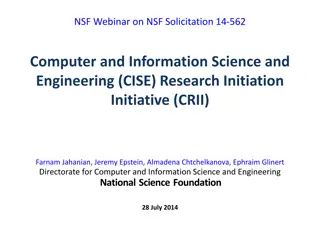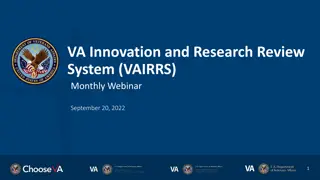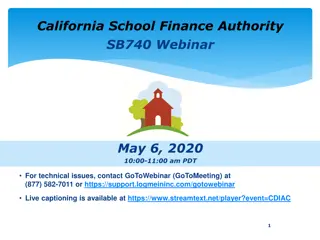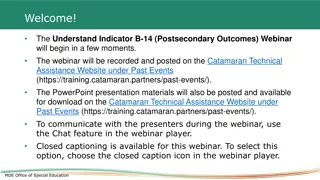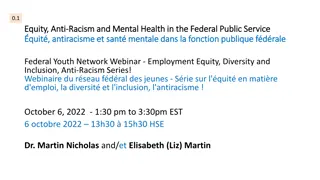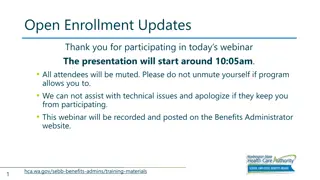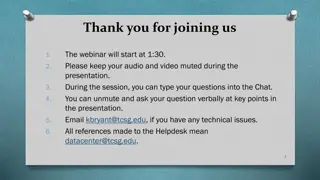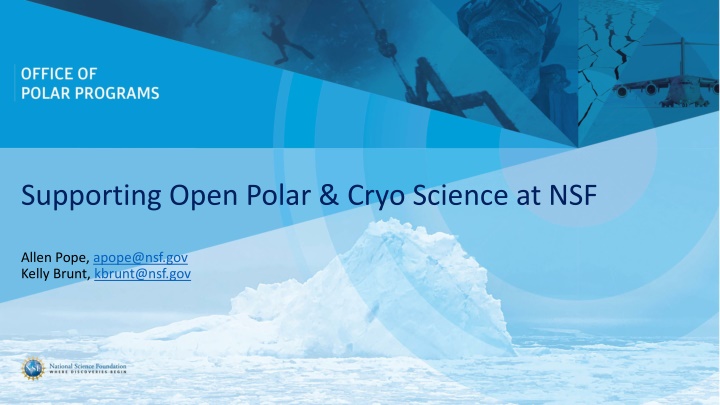
Open Science: Benefits, Limitations, and NSF's Initiatives
Explore the concept of Open Science focusing on its importance in scholarly research, data sharing, and methodologies. Learn about the advantages, challenges, and initiatives by the National Science Foundation (NSF). Discover principles and policies for managing research data effectively.
Download Presentation

Please find below an Image/Link to download the presentation.
The content on the website is provided AS IS for your information and personal use only. It may not be sold, licensed, or shared on other websites without obtaining consent from the author. If you encounter any issues during the download, it is possible that the publisher has removed the file from their server.
You are allowed to download the files provided on this website for personal or commercial use, subject to the condition that they are used lawfully. All files are the property of their respective owners.
The content on the website is provided AS IS for your information and personal use only. It may not be sold, licensed, or shared on other websites without obtaining consent from the author.
E N D
Presentation Transcript
Supporting Open Polar & Cryo Science at NSF Allen Pope, apope@nsf.gov Kelly Brunt, kbrunt@nsf.gov
What is Open Science? An Open Science Ecosystem Open science aims to ensure the free availability and usability of scholarly publications, the data that result from scholarly research, and the methodologies, including code or algorithms, that were used to generate those data. This & subsequent slides draw from, Open Science by Design: Realizing a Vision for 21st Century Research (NASEM, 2018)
Why Open Science? Rigor and reliability Ability to address new questions Faster and more inclusive dissemination of knowledge Broader participation in research Effective use of resources Improved performance of research tasks Open publication for public benefit
Limitations Costs & infrastructure Structure of scholarly communications Lack of supportive culture, incentives, and training Privacy, security, and proprietary barriers to sharing Disciplinary differences
Limitations that NSF is hoping to address Costs & infrastructure Structure of scholarly communications Lack of supportive culture, incentives, and training Privacy, security, and proprietary barriers to sharing Disciplinary differences
OPP Data Policy Leapfrogging with the polar research community Currently NSF 16-055 oDear Colleague Letter: Data Management and Data Reporting Requirements for Research Awards Supported by the Office of Polar Programs oRequirements for Data Management Plans, repositories, timelines, and more. ohttps://www.nsf.gov/pubs/2016/nsf16055/nsf16055.jsp Default to open aligns with the statement, as open as possible, as closed as necessary.
Data Management Principles FAIR Principles for Data Management Findability Accessibility Interoperability Reusability CARE Principles for Indigenous Data Governance Collective Benefit Authority to Control Responsibility Ethics https://www.go-fair.org/fair- principles/ https://www.gida-global.org/care
Polar Cyberinfrastructure The Polar Cyberinfrastructure program considers proposals that promote effective collaboration between Polar and cyberinfrastructure researchers (in both the Arctic & Antarctic solicitations). and/or will support proposals that provide significant benefit to the Polar research community including o cost-effective transfer of data from remote field locations; o long-term sustainable curatorship, standardization, management and discovery of data and metadata; o visualization, manipulation, and analysis, particularly for understanding complexity; [including AI & ML] o access and interoperability across scientific disciplines; o promotion of effective use of High Performance Computing (HPC) for direct and sustainable advances in current Arctic research; and o e-learning and educational tools based on cyberinfrastructure components.
NSF-wide Collaboration Works across GEO and with the Office of Advanced Cyberinfrastructure o https://www.nsf.gov/geo/geo-ci/index.jsp Opportunities like EarthCube, CSSI, FAIROS RCNs, CloudBank, PATh, and many others. This includes open, flexible, scalable, and interoperable cyberinfrastruture that will enable a broad and diverse community of geoscientists to integrate data, models, software, and knowledge. GEO is looking to building on existing efforts by promoting an ecosystem for geoscience research that: o Links data & models, big data & small data, networking knowledge from diverse perspectives, o Builds on EarthCube experience and investments to move towards flexible, scalable workflows and tools, and o Provides exemplars for advancing NSF priority areas for open & inclusive science, FAIR data, reproducibility & replicability, CARE & TRUST principles, and BA-JEDI.
NSF Support of Open Science Existing & upcoming solicitations - Full range of proposal types o Standard/Collaborative, Supplements Planning Proposals, RCNs, Workshop, CAREER, Mid-Career Advancement, Career-Life Balance, REUs, RAPID, EAGER, TCUP, RUI/ROA, FASED, HBCU-EiR, etc. There s still time in this fiscal year for supplements! o To address the original scope of the award o (In response to COVID or other changes/impacts) o Will sharing your data/code end up needing more resources? Open code supplements! NSF 21-041: Dear Colleague Letter: Supporting Data and Sample Reuse in Polar Research data/sample rescue, making data/samples available, reusing data/samples, and facilitating reuse. Takeaway: Do your homework, write a one-pager, and reach out to POs! Don t be afraid to ask! NSF supports all sorts of (well-reviewed) great ideas!










